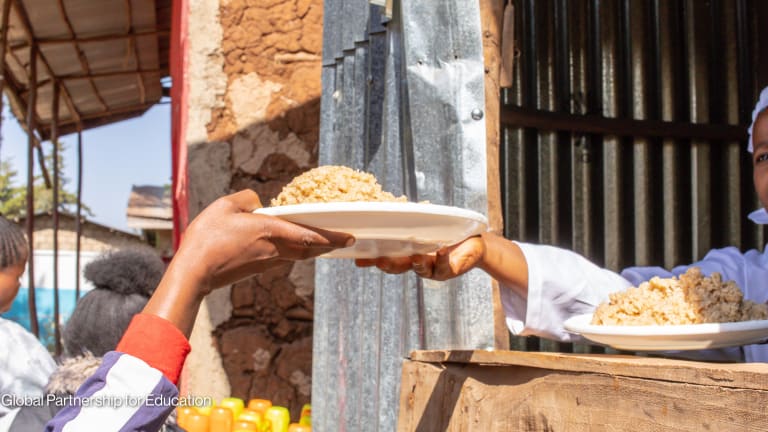
The time for action is now!
Globally, we are at a point where there is an unprecedented need to ensure a sustainable, resilient, and equitable future for all. Climate change has had devastating impacts — and the statistics are frightening. For many, the effects of climate change are experienced most acutely through water — too much or too little — and sanitation, which in turn dramatically affect health, productivity, economic growth, and security.
Why marginalized voices are critical for resilient WASH services
A bottom-up approach that involves women and people with disabilities in the design process is key to inclusive and resilient WASH services.
But climate change does not impact everyone in the same way. Women and girls, people with a disability, people living in poverty and other marginalized groups are further disadvantaged by climate change, yet often have untapped knowledge and experience that are essential for finding effective and sustainable solutions.
Last month’s COP 26 emphasized that, “We cannot afford to wait to act against the threat of climate change. We must work together to protect our planet and ensure a greener, more resilient future for us all.”
This is our collective challenge — and now is our opportunity to transform development approaches to make this vision a reality.
As a sector, we are already well positioned to build climate resilience, and provide a foundation for more cohesive, inclusive, and sustainable societies and economies.
—To make effective choices for a resilient future, more cross-sectoral action is required and the diverse perspectives and skills of all, including the marginalized, must be mobilized. Women, people with a disability, and other vulnerable groups, however, often lack political recognition and resources, and have limited opportunities to voice issues or influence policy and investment choices.
Now, more than ever, communities, governments and the development sector need to prioritize the voices of women and marginalized people, and support them to actively participate in problem solving and decision making for effective, localized climate action. Valuing the rights of women and vulnerable people when developing climate change solutions is also essential to sustainability.
Inclusive WASH is a cornerstone of climate resilience
Water, sanitation and hygiene, and climate change are intrinsically linked. Nearly three-quarters of natural disasters are water-related, and when they hit, can destroy critical WASH infrastructure, severely affecting the health, safety, food, and water security of thousands, if not millions, of people at a time. The WASH sector therefore has a critical role to play in our climate resilient future, with opportunities to mitigate climate change impacts and effectively support adaptation and increased social cohesion.
Without core WASH infrastructure and services to ensure the health and well-being of every member of society, the ability to effectively educate children, contribute to productive, sustainable economies, and build climate resilience within communities is limited. Investment in inclusive and sustainable WASH infrastructure and services is the foundation on which to build the climate resilient future envisaged by all.
As part of Australia’s aid program, Water for Women is delivering targeted research and practice for gender and socially inclusive WASH delivery. In partnership with 10 civil society organizations and five research institutions, Water for Women is delivering 33 projects to improve the health, gender equality, and well-being of Asian Pacific communities.
The fund directly supports inclusive WASH in communities, schools, health care facilities and markets, and seeks to transform WASH governance systems and policies to ensure they are inclusive, resilient, accessible for all.
As the Fund has progressed, it has increasingly focused its attention on the significant contributions of inclusive WASH programming and research towards climate resilience. A recently launched report, titled Making the Critical Connections between Climate Resilience and Inclusive WASH, showcases the work of partners in building climate resilient, inclusive WASH.
Examples include a WaterAid project in Papua New Guinea that is developing and applying an inclusive WASH and climate adaptation framework; an SNV project working across Bhutan, Laos, and Nepal that is mainstreaming climate resilience in rural WASH services; and research led by the Institute for Sustainable Futures at the University of Technology Sydney that supports community climate change responses for inclusive WASH in Timor-Leste and Indonesia.
Transforming responses by breaking silos
An increased focus on equity and inclusion, including through improved delivery and access to WASH infrastructure, is not just the “right” thing to do, but also the “smart” thing to do to improve sustainability and resilience. It mobilizes everyone in a community to play their role. And while improving inclusive WASH is a critical entry point and foundation for building climate resilience, it is obviously delivered within a broader context.
The interconnectedness of WASH to other development sectors was recognized at COP 26 and needs to be built upon. WASH contributes significantly to diverse sectors such as health, education, water resource management, and economic development, to name just a few. Our future depends on development sectors breaking down silos and building on each other’s strengths — working collaboratively to support inclusive, climate resilient communities and institutions.
We know now that we must accelerate the pace of transformation at the individual, community, and institutional levels. There is no better entry point than WASH. As a sector, we are already well positioned to build climate resilience, and provide a foundation for more cohesive, inclusive, and sustainable societies and economies.
With diverse voices, diverse stakeholders, and diverse sectors, we can truly transform our approaches to create a sustainable, resilient and equitable future for all.
Visit the WASH Works series for more coverage on water, sanitation, and hygiene — and importantly, how WASH efforts intersect with other development challenges. You can join the conversation using the hashtag #WASHWorks.









